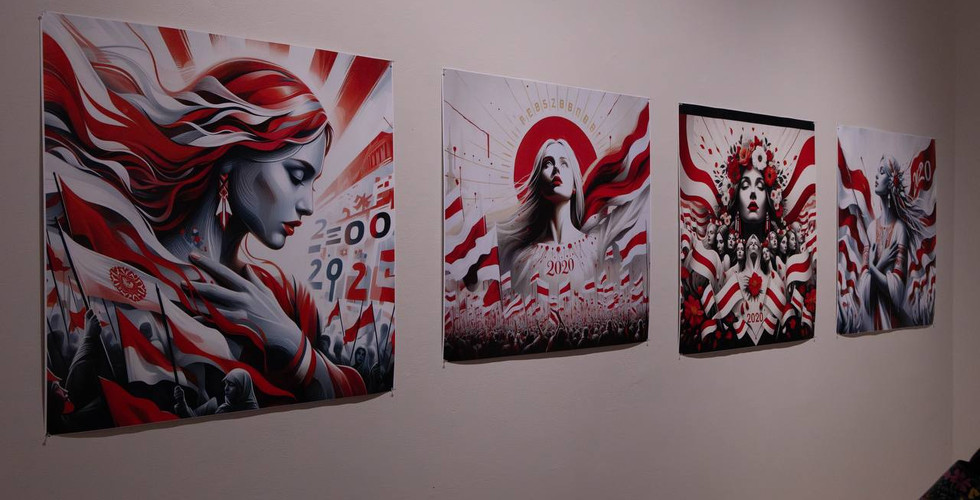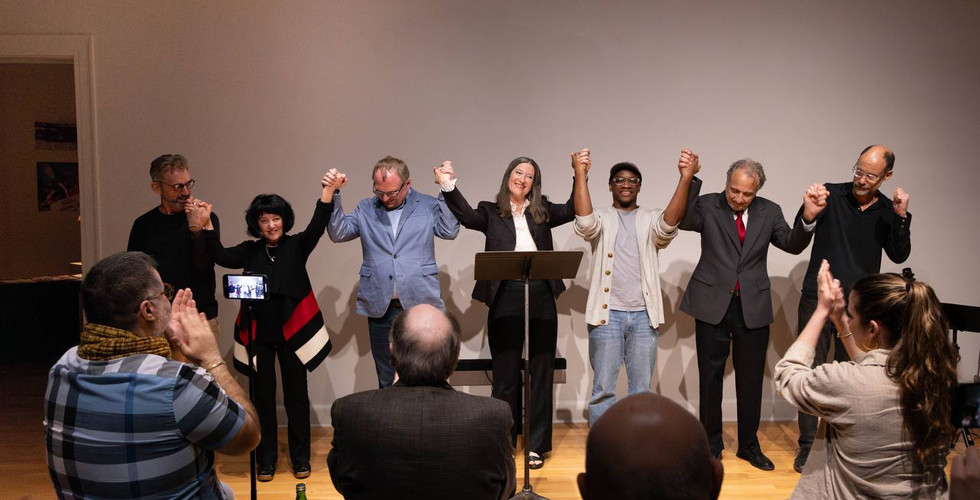Pavel Latushka’s speech at the public lecture dedicated to the opening of the exhibition "Voices of New Belarus"
- Feb 24, 2024
- 5 min read
Updated: Mar 28, 2024
Carroll Gallery of Tulane University, New Orleans 22.02.2024
Dear organizers and guests of the exhibition, ladies and gentlemen.
I thank all of you, as well as the leadership of the Gallery, Tulane University, Yale University, the organizers and participants of the exhibition and personally Mr. Andrei Kureichik for making this event possible.
And that within its framework I have an opportunity to address you on behalf of the United Transitional Cabinet of Belarus and the Belarusian democratic forces.
On the 20th of February, it became known about the death of political prisoner Ihar Lednik. His death became the fifth known case of death of a political prisoner in Belarus.
The first known case was the death of Vitold Ashurak in May 2021. In May 2023, political prisoner, blogger Mikalai Klimovich died in the colony. In July 2023, the famous Belarusian artist, political prisoner Ales Pushkin died. In January of this year – Vadzim Khrasko.
I don't have much time today, just a few minutes, but I ask you to join me in honoring the memory of the deceased political prisoners with a minute of silence.
Thank you, solidarity is very important. When Belarusians are killed in Lukashenko's prisons — killed by torture, inhuman conditions of detention, lack of medical care — solidarity of the civilized world with Belarusan political prisoners is more important than ever. Solidarity and the widest possible publicity.
We cannot keep silent and inactive when in a European country there are almost one and a half thousand (!) officially recognized political prisoners. Although in reality this figure is at least three times higher.
We cannot keep silent when people are tortured, when they are deprived of the right to any communication with the outside world. And we know nothing about the condition of political prisoners Mikalai Statkevich, Ihar Losik, Siarhei Tsikhanouski, Maria Kalesnikava and many others. We don't even know if they are alive.
We cannot keep silent and inactive when the Nobel Peace Prize winner, the famous Belarusian human rights activist Alies Bialiatski is in prison. When all independent mass media, NGOs, political parties are liquidated. These are thousands of organizations, banned and expelled from the country by the regime.
When more than 200 political prisoners in Belarus are on the humanitarian list. These are elderly people, people with disabilities, people with oncology and other serious diseases.
The lives of these people are in real danger. In principle, any political prisoner in Belarus is at risk. And not only political prisoners. All those who disagree with the regime are at risk. And such Belarusians are the majority.
To estimate the scale, let me cite one figure — according to the report of the Justice Hub Center for Law and Democracy, from May 2020 to May 2023, at least 136 thousand (!) people became victims of the regime's crimes against humanity.
Illegal deprivation of liberty, torture, murder, rape and other grave forms of sexual violence, including against minors, enforced disappearances, deportations — this is what happens in Belarus. Every day. This is the reality in which Belarusians have been living for almost 4 years.
And this reality will not change as long as the Lukashenko regime exists in our country.
Until the dictator and his accomplices are held accountable and until this regime is abolished. It is impossible to negotiate with it, to pacify it, to appeal to its common sense. Such regimes understand only the language of accountability and force.
Any other approaches only strengthen their conviction that Western democracies are weak and helpless. Only motivate, yes, to continue and scale up their crimes. Because even the deepest concern of Western politicians does not compare to how deeply Lukashenko does not care about it.
Lukashenko can be spoken to only in the language of force, in the language of action, if we are talking about the release of thousands of Belarusian political prisoners. And if we are talking about stopping his complicity in Russia's war against Ukraine. And he has been participating in it from the first day.
It was from the territory of Belarus, with the full assistance of dictator Lukashenko, that troops entered the Kiev region. And organized a terrible massacre in Bucha and other cities. It was from the territory of Belarus that more than eight hundred missiles were fired at Ukraine.
Lukashenko's regime has put the Belarusian economy on military rails. It produces and transfers to Russia weapons, shells and ammunition that kill Ukrainians. It helps Russia circumvent sanctions — because sanctions against the two aggressors, Lukashenko's regime and Russia, are still not the same. And many goods that should not be imported into Russia are imported into Belarus. And then — to Russia.
And finally, Lukashenko is involved in the kidnapping of Ukrainian children. A war crime. Last year, our team, the National Anti-Crisis Management, collected evidence, prepared and submitted to the International Criminal Court in The Hague a Communication on the Illegal Deportation or Transfer of Ukrainian Children from the Russian-occupied territories of Ukraine to Belarus.
On the 16th of November, 2023, the Humanitarian Research Lab of the Yale School of Public Health published a report revealing Alexander Lukashenko's involvement in the systematic transfer of Ukrainian children to Belarus. The published report contains references to our materials, and the report itself confirms all the facts provided by the National Anti-Crisis Management to the ICC.
But the responsibility has still not come.
So what to do? How to stop people like Lukashenko?
They must be punished. They must be punished with tough, shock economic sanctions — without deferrals, without derogations, without possibility of circumventing them.
They must be held criminally liable. There is more than enough evidence of crimes against humanity and war crimes committed by Lukashenko. There are also grounds for issuing an international arrest warrant against him. It just needs to be done.
And this is important not only for helping Belarus. But also to help Ukraine, which is fighting for its very existence.
Back on the 30th of November, at a meeting of NATO foreign ministers in Bucharest, Urmas Reinsalu, then the Estonian Foreign Minister, said:
"The strongest sanction we can impose against the Russian regime is the fall of the Lukashenko dictatorship."
But this requires political will. Which, unfortunately, is still lacking (лЭкин) in the West. But we, you, me, can shape it. If we are not silent. If we stand in solidarity.
I will finish with one more quote, which I think many of you have heard:
"The only thing necessary for the triumph of evil is for good men to do nothing."
Today, unfortunately, evil triumphs. For now. And that means it's time to act!
Thank you for your attention.
Жыве Беларусь! И слава Украине!












Comentarios